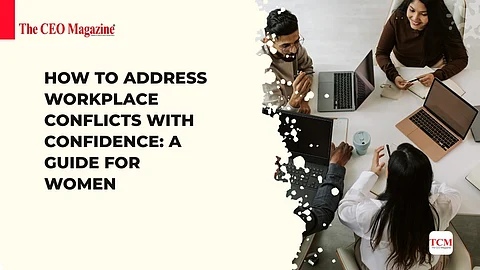
- News
- Women
- Magazine
- IndustryIndustry
- InsightsInsights
- Success Stories
- PublishPublish
- ContactContact
- Media KitMedia Kit

How to Address Workplace Conflicts with Confidence: A Guide for Women
Workplace conflicts are inevitable, whether you’re in a leadership position or an individual contributor. As a woman in business, it’s essential to handle conflicts with confidence, not only to maintain professionalism but also to set a precedent for others. Successfully navigating conflicts can enhance your credibility and leadership skills. This guide provides actionable strategies to address workplace conflicts confidently, fostering a healthy work environment.
Conflicts at work can arise due to differences in opinions, personalities, work styles, or even expectations. These differences are natural in diverse teams, but unresolved conflicts can harm productivity and morale. Women in the workplace may face unique challenges, such as gender biases or being perceived differently when they assert themselves. Understanding the root causes of conflicts is the first step toward resolving them effectively.
Women often face additional pressures when dealing with conflicts in the workplace. There’s a fine line between being assertive and being labeled as "too aggressive" or "emotional." This stereotype can make it more challenging for women to express their opinions during conflicts. A key part of addressing workplace disputes with confidence is recognizing these biases and navigating them with a clear strategy that highlights professionalism and calmness.
The first rule in any workplace conflict is to stay calm. Even when the situation is tense, showing emotional control demonstrates professionalism. Avoid reacting impulsively, and take time to process the situation before responding. Practicing mindfulness or deep breathing exercises can help you stay centered during high-pressure moments.
Before jumping into a resolution, take a step back to assess the situation from a neutral standpoint. Try to understand the other person’s perspective and the potential factors contributing to the conflict. By assessing the situation objectively, you can avoid misunderstandings and tackle the root cause of the problem.
Assertive communication is crucial when addressing conflicts. This means expressing your thoughts clearly and confidently without being aggressive or passive. Use "I" statements to explain how you feel, for example, "I felt that my input was not fully considered," rather than "You ignored my input." This keeps the conversation focused on the issue, not personal attacks.
Effective conflict resolution is a two-way street. Listening to the other party is just as important as making your point. Show empathy by acknowledging the other person's perspective and validate their feelings, even if you disagree. This creates a more collaborative environment for resolving the issue.
Conflicts often stem from differences in goals or approaches. Instead of viewing the conflict as a battle to be won, strive to find a solution that benefits both parties. This win-win mindset can lead to more constructive discussions and longer-lasting resolutions. Suggest compromises or alternative solutions that address both your needs and the needs of the other party.
Sometimes, despite your best efforts, a conflict may require the involvement of a mediator or manager. Knowing when to escalate the issue is an important part of conflict resolution. If the conflict is affecting your work or the team’s productivity and you’ve exhausted all personal efforts to resolve it, it’s time to involve a higher authority.
Once a resolution is reached, follow up to ensure the issue doesn’t resurface. Check in with the other party after a few days or weeks to confirm that the agreed-upon solution is working. This reinforces your commitment to maintaining a positive working relationship and helps prevent future conflicts.
Confidence in conflict resolution doesn’t come overnight. It is a skill that is developed through practice and experience. For women, building confidence may involve challenging societal expectations and biases that affect how they are perceived. Here are a few strategies to help build confidence:
Practice Assertiveness: Practice assertive communication in everyday situations so that it becomes second nature in conflict scenarios.
Seek Feedback: After handling a conflict, ask trusted colleagues for feedback on how you managed the situation. Constructive feedback can help you improve.
Develop Emotional Intelligence: Emotional intelligence (EQ) plays a significant role in conflict resolution. By improving your ability to understand and manage emotions—both yours and others'—you’ll be better equipped to handle workplace disputes.
Having a mentor or ally can be an invaluable resource when dealing with workplace conflicts. Mentors can provide guidance and share personal experiences, offering advice on how to approach difficult situations. Allies, on the other hand, can support you during conflicts, reinforcing your points or backing your claims when necessary. Cultivating a network of supporters helps bolster your confidence and ensures you’re not facing workplace challenges alone.
Workplace conflicts are unavoidable, but they don’t have to be detrimental to your career or work environment. By addressing conflicts with confidence, you can not only resolve issues but also strengthen your leadership and communication skills. For women in business, learning how to handle conflicts professionally and assertively is a powerful tool for long-term success.
Follow us on Google News
